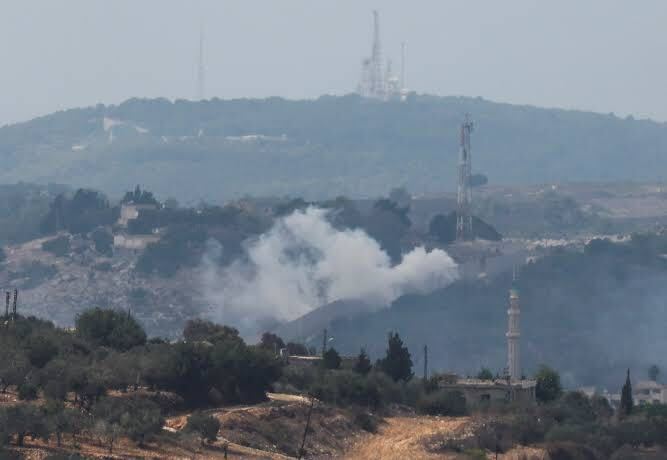The ever-escalating tensions along the Lebanon-Israel border have raised fears that armed groups could potentially join the war in support of Palestinian fighters.
Over 19,000 people in Lebanon have been internally displaced since early October when Israel launched one of the deadliest wars on Gaza, the United Nations migration agency, the International Organisation for Migration (IOM) reported.
The IOM reported that 19,646 people had been displaced inside Lebanon since it began tracking movements on 8 October, the day after Israel’s offensive attack on the besieged Gaza Strip, which has also included cross-border shelling into Lebanon.
The majority of these displacements have been from the south of Lebanon, with some individuals relocating from other areas as well. “We expect the numbers to rise as the cross-border tensions continue,” warned IOM spokesperson Mohammed Ali Abunajela, according to AFP news agency.
Since 7 October, Gaza has been subjected to a deadly Israeli bombing campaign that has killed at least 5,087 Palestinians, including more than 1,700 children, though more than 1,000 are still believed to be trapped under the rubble.
Since then, Iran-backed Hezbollah has stepped in to increase pressure on Israeli targets. This has led to Israeli cross-border strikes and bombardments on Lebanon.
Israeli communities have been ordered to evacuate, and thousands of individuals in Lebanon have fled border towns to other areas in the south or closer to the capital, Beirut.
Abunajela expressed concern about the situation, saying the movement of people in Lebanon is not helping an existing “deteriorating” predicament in the country.
“Amidst a deteriorating economic situation and the significant rise in poverty across all populations in Lebanon, internal displacements may add additional stress to the resources of host communities,” he noted.
Many of those who fled southern Lebanon have sought refuge in the coastal city of Tyre, located 18 kilometres from the border.
However, this influx is straining the resources of both host families and the Lebanese government, which is already juggling with economic challenges.
Inaya Ezzeddine, a lawmaker from Tyre, revealed that around 6,000 people have sought refuge in the city, with three schools being used to shelter some of them.
“This war is happening amid a very big economic crisis and people don’t have provisions,” Ezzeddine told the Reuters.
She voiced concerns about the impact on education, saying: “We cannot open all schools because schools are still operating. Every school we open [for the displaced], we’re depriving its pupils from using it.”
The ever-escalating tensions along the Lebanon-Israel border have raised fears that armed groups could potentially join the war in support of Palestinian fighters.
Analysts have cautioned that Hezbollah could intensify its involvement if Israel launches a ground invasion of Gaza.
So far, Hezbollah confirmed 27 of its fighters have been killed since 7 October, while Lebanese security sources indicate that 11 fighters from Palestinian groups in Lebanon, which are allied with Hezbollah, have also lost their lives, as reported by Reuters.
Meanwhile, US President Joe Biden and his senior advisors have reportedly been adamantly advising Israeli officials against initiating any significant military action against Hezbollah, reports said. The concern, as reported by both American and Israeli officials, is that such a move could potentially involve Hezbollah in the ongoing Israel war on Gaza.
American officials are particularly worried that certain members within Israel’s war cabinet have expressed a desire to confront Hezbollah, even as Israel engages in an extended war against Palestinians following the attacks that began on 7 October.
US officials are making it clear to their Israeli counterparts that simultaneously battling Hamas in the south and the significantly more powerful Hezbollah in the north would present considerable challenges, reports detailed. Washington has argued that Tel Aviv would face substantial challenges in a two-front war, and such a scenario could lead to the involvement of both Iran and the US itself.
The revelation of the extensive efforts by top American officials to prevent Israeli regime’s military operation against Hezbollah, disclosed on the New York Times on Friday, highlights the concerns of the Biden administration regarding the war plans of Israel’s Prime Minister Benjamin Netanyahu and his associates.
Meanwhile, Qatar has been at the forefront of de-escalation efforts since the start of the deadly Israeli aggression on Gaza.
Officials in Doha have been in close contact with key international partners— namely the United States, the United Kingdom, Iran, Turkiye, Egypt, Jordan, Saudi Arabia, among others—in an effort to end the Israeli escalations in Gaza. So far, Doha has managed to mediate the release of four captives held by Hamas.
‘Enough is enough’
On Tuesday, Qatar’s Amir Sheikh Tamim bin Hamad Al Thani slammed Israel’s “barbaric and unprecedented bombing” of Gaza on and condemned countries around the world for their unconditional support of Israel’s killing of Palestinians.
“We are saying enough is enough. It is untenable for Israel to be given an unconditional green light and free license to kill, nor is it tenable to continue ignoring the reality of occupation, siege and settlement,” Sheikh Tamim told the Shura Council in Doha on Tuesday.
Addressing the weeks-long brutal campaign, Sheikh Tamim said Palestinians in Gaza “are living in difficult circumstances beyond imagination, and it is not permissible to remain silent about the barbaric and unprecedented bombing that civilians are being subjected to.”
Sheikh Tamim also took aim at those standing in support of Israel as it continues its bombing campaign on Gaza, where half of the population are under the age of 15.
“We would like to ask those who have aligned with the war, and those acting to gag any dissenting opinion: What would come in the aftermath of this war?” he said.
The Qatari leader underscored the seriousness of the situation in Gaza and its violations of all “religious and worldly values, customs and laws” in addition to Israel’s ongoing policy of settlement expansion and displacement.







